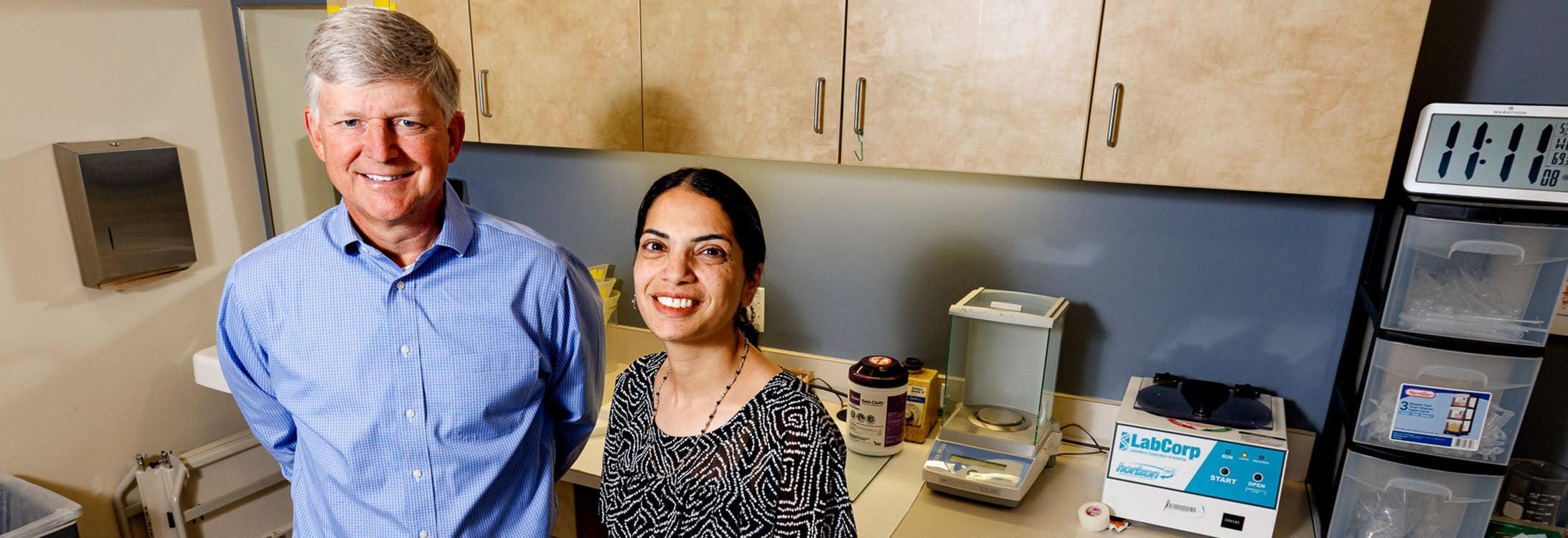WORKAHOLISM AND DIABETES
ECU faculty awarded grant to research link between workaholism, Type 2 diabetes
East Carolina University faculty in the Thomas Harriot College of Arts and Sciences and the Brody School of Medicine have received $451,053 in grant funding from the National Institutes of Health to research an association between workaholism and insulin levels that may lead to the development of Type 2 diabetes (T2D).
Dr. Shahnaz Aziz, associate professor of psychology, is leading the study with co-investigators Dr. Darrell Neufer, professor of physiology in the Brody School of Medicine and director of the East Carolina Diabetes and Obesity Institute, and Dr. Karl Wuensch, professor of psychology. Additionally, they are in the process of recruiting ECU student researchers who will participate in data collection, analysis and reporting.
“Although typically out of the domain of an industrial/organizational psychologist, I’ve always aspired to further investigate the health of workaholics and delve into the potential association between workaholism and specific metabolic factors as assessed with biological data. Thus, receiving an NIH grant to study this topic is a dream come true,” Aziz said.

Neufer and Aziz conduct research at the East Carolina Diabetes and Obesity Institute.
Aziz said that many factors contribute to the development and progression of Type 2 diabetes, including diet, exercise, genetics, environmental exposures, socioeconomics, age, sex, geography, and behavioral patterns.
According to Aziz, there is little current research on the potential connection between workaholic behavior and impaired metabolic outcomes, such as Type 2 diabetes. However, research does indicate these behaviors lead to other diseases, which spurred her interest in the topic.
“Among behavioral patterns, emerging evidence suggests workaholism is a contributing factor in coronary heart disease and stroke, two diseases that are often macrovascular complications of and/or complicated by prolonged T2D,” Aziz said.
Neufer, who studies mechanisms of insulin resistance in both mice and humans, will work directly with Aziz in coordinating the clinical research support for her project through the East Carolina Diabetes and Obesity Institute (ECDOI).
“This project is a perfect example of how ECDOI can help faculty by providing access to clinical research personnel and services, equipment and expertise in research related to metabolism,” he said.
Wuensch, who is a statistician with expertise in research design and multivariate statistics, will assist Aziz in the lab, integrating the data using statistical analyses to address how workaholism is associated with glucose/insulin and lipid profiles. He also will train students in statistical analysis once data collection has occurred.
“I am looking forward to working with the data to be gathered during this NIH grant-funded research,” Wuensch said.
Although in the very early stages of the study — Aziz and her team are currently screening and enrolling patients — they are eager to see what the data reveal and the importance the research may provide for future research and the community at large.
“Given that T2D is a global pandemic, this line of research is expected to have a strong impact,” Aziz said. “Our data will provide the groundwork and set the basis for initiating longitudinal studies that would then address underlying mechanisms by which workaholism could contribute toward impaired metabolic outcomes.
“Establishing a relationship between workaholism and specific metabolic outcomes will provide the basis for testing interventions designed to modify workaholic behaviors and its potential impact on insulin resistance, prediabetes and ultimately T2D,” she said.
If Aziz’s team demonstrates a link between workaholism and Type 2 diabetes, this will allow them to focus on ways to modify workaholic behaviors to improve glycemic and lipid levels, perhaps preventing the onset of health issues.
“Doing so would ultimately improve the health and well-being of employees, including those in eastern North Carolina,” Aziz said.
Individuals interested in participating in the study may find more information on the ECDOI research website under the workaholism research study headline.
Related
Statin in Focus
